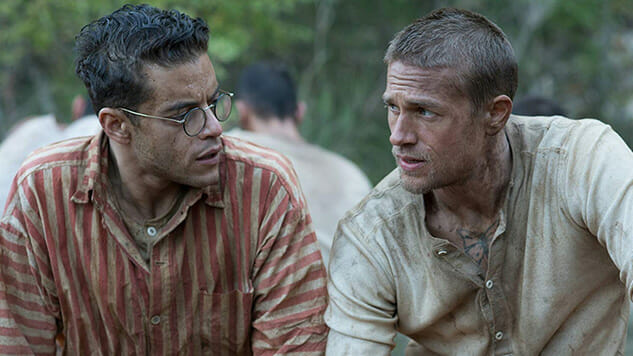
Though ostensibly a remake of Franklin J. Schaffner’s 1973 film, Papillon 2018 concerns itself with only namechecking the Henri Charrière memoirs on which both are based, keeping the Steve McQueen and Dustin Hoffman vehicle at a cognitive distance lest you question why this new one was made at all. Maybe at this point in time, in culture, here at the End of History, a thing—especially a remake or reboot or recontextualization—need not justify its existence without wading pantsless into treacherous terrain regarding the illusion of originality scarring our artistic landscape, but one can’t help but wonder what motivated everyone here, led by director Michael Noer, to want to tell this story anew—other than masochism. Papillon just rolls around in that shit.
Like the best ’90s Oscar bait anyone could dream up, Papillon is about the triumph of the human condition over monolithic oppression, about unchecked power structures left to their own devious devices, about seemingly ordinary nobodies accomplishing extraordinary feats though the universe is hellbent on defeating them. It’s also mostly about suffering—both for the characters on screen and the actors playing those characters—and so it makes sense, at least for a generation of Millennials horny to declare that art released before their time is relevant now more than ever, that the story of a petty Parisian thief sent to a relentlessly miserable prison camp in French Guiana should have something to say about today’s prison industrial complex, or the complicity of world powers in colonialistic suffering, or how there are still method actors willing to lose 35 pounds and look really gross for a role that might win them an award. It’s true that no one’s really making films like this anymore, but it’s also true that everyone pretty much wants to.
Charlie Hunnam stars as the titular “Butterfly,” which is what everyone calls Charrière, both because of the tattoo on his chest and because he’s apparently good at escaping from prison, as it’s established early in the film after he’s fingered for a murder he didn’t commit, that escape is basically one’s only way out of the 1930s French prison system. Following an expectedly brutal boat trip to the African continent, in which a horrifically revolting prisoner in league with the guards guts a wimpy fellow prisoner to retrieve the cash he knows is stashed inside, Papillon (whom everyone calls “Papi” like we’re listening to a Ja Rule track) falls in with the also-wimpy Dega (Rami Malek), coaching him on how to survive. Prison life is hell, but it’s nothing compared to solitary confinement, which is where Papi’s sent once their first breakout attempt fails. Meanwhile, Dega ass-kisses his way into the good graces of the warden (Yorick van Wageningen, blandly evil, because so is this world), setting the stage for the duo’s second escape, and then eventual marooning on the Prison to End All Prisons, Devil’s Island.
Compelling throughout, Papillon thrives care of its character actors’ dedication, Hunnam continuing to be charming despite his ceaselessly dour presence, and Malek doing his over-inflected weird voice thing, which at some point transforms from confusing to soothing, a mark of academic intelligence maturing into emotional genius. Capturing the prisoners’ living nightmare in all of its handsome grotesqueness, cinematographer Hagen Bogdanski (whose last triumph was most likely The Lives of Others) rarely flinches at all the grit and grime caking their world (unless it happens to be full-frontal male nudity). Yet, even overlooking how we know Papi will survive because he wrote the memoirs on which the movies are based, and intuiting that this will ultimately be a film about legendary perseverance, Papillon never surprises, its tacked on ending and slide show of “real-life” photographs detailing the horrors of French prisons during the film’s credits giving the impression that even the filmmakers knew, deep down in their humanistic hearts, that they could have just let the original film be.
Director: Michael Noer
Writer: Aaron Guzikowski
Starring: Charlie Hunnam, Rami Malek, Roland Møller, Joel Basman, Yorick van Wageningen
Release Date: August 24, 2018
Dom Sinacola is Associate Movies Editor at Paste and a Portland-based writer. You can follow him on Twitter.